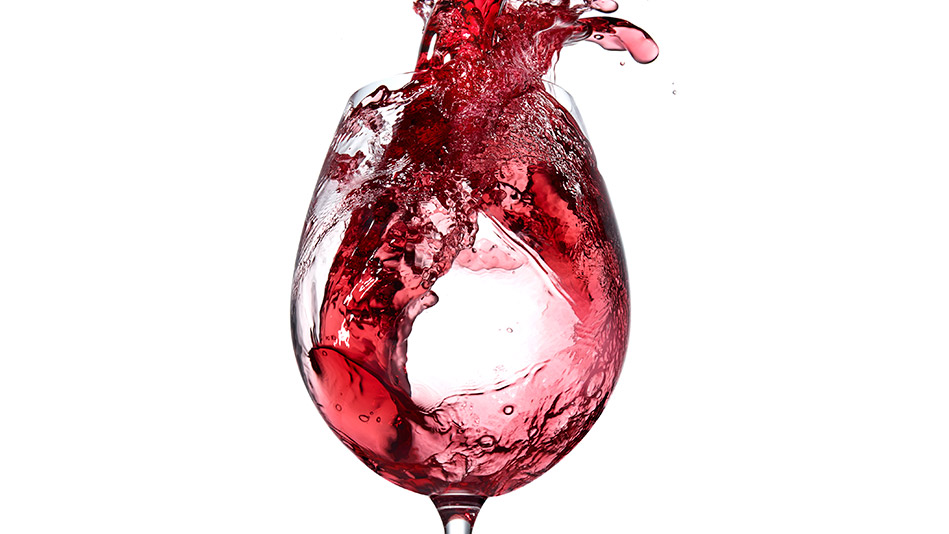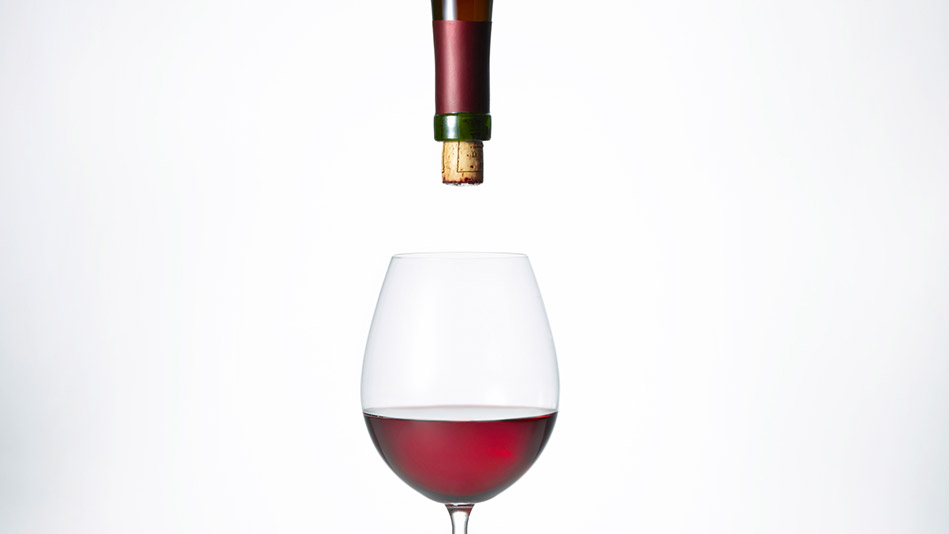Ashley Sakker knew she drank a little too much and a little too often, but she also knew she wasn't willing to give up her wine habit entirely. Looking for help, she discovered that abstinence wasn't her only option.

Photo: Adam Voorhes
4 P.M. The kids are having a meltdown. One is wailing because she poked herself in the eye. Not to be outdone, the other joins in with his own chorus of sobs. I soothe them. Then I soothe myself, uncorking a half-empty bottle of Pinot Grigio I pull from the fridge.
5:30 P.M. Hoping to prolong the effect of the wine's warm hug, I top off my glass before bath time as I beg and bribe the kids to get into the tub.
7 P.M. My husband and I head over to our neighbor's boozy backyard barbecue, where my girlfriends and I tip back crystal goblets of Cabernet. Before I know it, the tally is easily up to five, six—could it be seven?—drinks.
On nights like this, everything feels shaded in Technicolor—jokes are funnier, gossip sharper, affection greater. My social life has almost always included some amount of drinking: I regularly went out for happy hour with my coworkers, drowning the stress from our jobs as educational counselors in cheap Chardonnay; I threw back beers at baseball games with my husband to unwind and reconnect; I bar-hopped with my childless girlfriends on the rare nights I could swing a sitter. Drinking was, in one defining word, fun. A harmless, but necessary, escape.
About four years ago, however, drinking morphed into something that was not all that fun. I was 34, had just had my second child and decided I couldn't juggle the demands of two young children and a full-time job. As a stay-at-home mom whose husband worked 12-hour days, I was isolated and, to be honest, really bored. I didn't fit in with my new mommy friends. I had less time for my true friends, many of whom were still single. I felt unmoored. Lost. It became easy to have an afternoon drink, and then another, and then another—sometimes I'd polish off a bottle. I'd numb out at night and feel like crap in the morning. I shut out my husband and snapped at my kids.
One morning, when I was unusually short with my daughter, she responded, "I don't like when you drink wine, Mommy. I don't like the smell." The oaky aroma was still on my breath from the night before. Her comment was so innocent and yet so dead-on. I knew I was wrong—and not just for getting angry with her. Because, well, I had been her. I was the daughter who smelled alcohol on my father's breath and cleaned up the empty bottles strewn around him while he lay on the couch.
My father was a raging drunk for nearly 11 years. And I found some solace in knowing I wasn't like him. I might have been fooling myself, but on a scale of one to Dad, my drinking never seemed that serious. I wasn't physically dependent on the stuff—I never woke up needing a swig to still the tremors, never drank and drove, never hid empty bottles. I could go long stretches without any alcohol just because I wasn't in the mood to drink. Yet I knew that my drinking, especially when I did it alone, was becoming a problem. It was a preoccupation, a crutch. That said, I didn't need—or, more important, want—Alcoholics Anonymous (AA). I wasn't interested in abstinence; drinking, in moderation, was still an enjoyable thing in my life.
5:30 P.M. Hoping to prolong the effect of the wine's warm hug, I top off my glass before bath time as I beg and bribe the kids to get into the tub.
7 P.M. My husband and I head over to our neighbor's boozy backyard barbecue, where my girlfriends and I tip back crystal goblets of Cabernet. Before I know it, the tally is easily up to five, six—could it be seven?—drinks.
On nights like this, everything feels shaded in Technicolor—jokes are funnier, gossip sharper, affection greater. My social life has almost always included some amount of drinking: I regularly went out for happy hour with my coworkers, drowning the stress from our jobs as educational counselors in cheap Chardonnay; I threw back beers at baseball games with my husband to unwind and reconnect; I bar-hopped with my childless girlfriends on the rare nights I could swing a sitter. Drinking was, in one defining word, fun. A harmless, but necessary, escape.
About four years ago, however, drinking morphed into something that was not all that fun. I was 34, had just had my second child and decided I couldn't juggle the demands of two young children and a full-time job. As a stay-at-home mom whose husband worked 12-hour days, I was isolated and, to be honest, really bored. I didn't fit in with my new mommy friends. I had less time for my true friends, many of whom were still single. I felt unmoored. Lost. It became easy to have an afternoon drink, and then another, and then another—sometimes I'd polish off a bottle. I'd numb out at night and feel like crap in the morning. I shut out my husband and snapped at my kids.
One morning, when I was unusually short with my daughter, she responded, "I don't like when you drink wine, Mommy. I don't like the smell." The oaky aroma was still on my breath from the night before. Her comment was so innocent and yet so dead-on. I knew I was wrong—and not just for getting angry with her. Because, well, I had been her. I was the daughter who smelled alcohol on my father's breath and cleaned up the empty bottles strewn around him while he lay on the couch.
My father was a raging drunk for nearly 11 years. And I found some solace in knowing I wasn't like him. I might have been fooling myself, but on a scale of one to Dad, my drinking never seemed that serious. I wasn't physically dependent on the stuff—I never woke up needing a swig to still the tremors, never drank and drove, never hid empty bottles. I could go long stretches without any alcohol just because I wasn't in the mood to drink. Yet I knew that my drinking, especially when I did it alone, was becoming a problem. It was a preoccupation, a crutch. That said, I didn't need—or, more important, want—Alcoholics Anonymous (AA). I wasn't interested in abstinence; drinking, in moderation, was still an enjoyable thing in my life.

Photo: Adam Voorhes
When my husband and I first met, we enjoyed sampling fine wines and learning how to spot a good bottle. We collected wine the way some people collect art. And I liked how a glass of Sauvignon Blanc could soften the edges of a difficult day, could temper the tone in which I spoke to my husband when my nerves were frayed. It eased me into a better, calmer version of myself, and I didn't want to give that up.
Turns out, I wasn't the only one resistant to AA's all-or-nothing model. When I Googled "alternatives to heavy drinking," I found the website for a group called Moderation Management (MM), which offers a program—including group meetings, online support and behavioral guidelines—to help people regulate their habit. I bought the MM guide, Responsible Drinking, and after months of procrastinating, I finally completed the in-book questionnaire. My answers to the 15 questions—such as "Do you drink in the morning, afternoon, and evening?" and "Is getting drunk more important than your next meal?"—put me at an eight out of 45, suggesting that I had a low physical dependence and making me a likely candidate for the program.
The first meeting wasn't what I expected. I'd pictured a depressing gathering of desperate people. Instead, I was met by a lively group—professional, pulled-together folks of every age, a handful of them young mothers—who took turns sharing how well (or poorly) they had managed their drinking the previous week and offering tips and encouragement. When the soft-spoken—angelic, really—middle-aged moderator gave me a turn to speak, I admitted, for the first time, how hard it was to be home by myself five nights a week with my children, and how easy it was to drink. The warmth and understanding I felt from the group in that moment was almost physical. These are my people, I thought. As soon as I got home, I asked my babysitter to come every Tuesday night.
Of course, that was just the first step. To really commit to the program, you have to complete "the Thirty"—30 days or more alcohol-free to break the habit. The first two weeks were incredibly hard because I was left to deal with the kids' petty squabbles without my crutch. But instead of swan diving into a gallon of Gallo—and believe me, I thought about it—I dove deep into the book for answers. Rather than dictating some bullet-pointed marching orders, MM guides you in becoming conscious of why you are using alcohol—with exercises that help you pinpoint your triggers, for instance—and what you can do to change. I became acutely aware that I often turned to alcohol when I was lonely or anxious; so when emotions escalate, I'm now more likely to pop in a yoga DVD to de-stress or call my babysitter and go to a gallery opening with a friend.
MM recommends that you abstain from alcohol at least three or four days a week—I mark them on a calendar with an X. Each denotes a tiny victory. On the days I do drink, I shoot for having no more than three glasses of wine spaced out over three hours with lots of water in between—and not more than nine total in a week. It's not easy; there's so much wiggle room. A few months ago, I went to a concert with friends, and although I had my three-drink plan all worked out, I got caught up in the fun. They had ordered more Champagne while I was in the bathroom, and I thought, What the hell, why not? I woke up the next morning in a haze of guilt, questioning whether I'd ever succeed at drinking moderately. But giving up wasn't an option—I had my husband and kids to think about. I made peace with my slip-up and used it as an opportunity to explore why I hadn't cut myself off.
It's because of these temptations that I turned down a recent trip to a river festival. I knew I wasn't strong enough to withstand the all-day drinking. I'm not there yet, and in my most honest moments, I know I may never be. I've seen people moderate their drinking with unbelievable control, but I've also seen people drop out of MM and make a beeline for AA, deciding that abstinence, in all its clarity, is better. I may eventually join them, but for now, I'm making progress. On most occasions, I'm drinking less, and when I do, I can savor all the good things about a glass of wine, instead of using it to blunt deeper emotions.
One of the lines in the MM book that really resonates with me is the mantra "Keeping busy with purposeful work and with pleasurable activities is important for me, if I am to continue to be a moderate drinker." For so long I had substituted abusing alcohol for living a rich life. Now I'm applying for jobs in education counseling because that work feeds my soul. I've even started moderating my own MM meetings on Thursday evenings. Some nights when I return home, I pour myself a glass of wine. Other nights I don't. What matters most is that I'm still in control enough to make that choice.
Gretchen Voss is a writer based in the Boston area.

Photo: draghicich/iStock/Thinkstock
Is Moderation One Big Myth?
We asked Michael Levy, PhD, outpatient director of substance use services at North Shore Medical Center in Massachusetts and author of Take Control of Your Drinking...And You May Not Need to Quit, to weigh in on this alternative to AA.
Q: Abstinence is still the number one way to treat alcoholism. Why do you consider moderation a viable option?
A: So many of us believe that not drinking is the only choice. That's how I was trained in school, too. But people with drinking problems fall on a wide continuum. Of course, some people will never be able to control their drinking—you hand them a thimbleful of beer, and they're off and running. But that's not the case for everyone. What often drives people away from treatment is that they know they'll be told they can never drink again; they just can't handle the thought. If you offer an approach that's less threatening, they may be more likely to give it a try.
Q: If moderate drinking isn't for everyone, how do you determine whether someone is a good candidate?
A: One of the first things I look for is whether the person has ever been so dependent on alcohol that they experience withdrawal symptoms when they stop. Those people have a harder time moderating successfully. Same for a drinker who's been hitting the bottle daily for decades—that habit is going to be harder to break. I've also found that those who succeed at moderate drinking tend to have a more stable life and a strong support network.
Q: How do you respond to those who say this is only delaying the inevitable, that people who think they can moderate are kidding themselves?
A: Studies have shown that people with drinking problems can learn to moderate under the right guidance. One study analyzed people who were in recovery for at least a year. Levels of recovery included not drinking; drinking within recommended guidelines, called low-risk drinking; and somewhat heavier drinking, which was more than the recommended guidelines but wasn't causing the participants any huge problems. Three years later, they found that about 50 percent of the drinkers in the last group were still in control—they hadn't tipped back into abusive drinking and weren't dependent on alcohol.
Q: What's your take on groups like Moderation Management?
A: They can absolutely be helpful, but they aren't for everyone. Much in the same way AA isn't for everyone. Though MM does offer some pretty sound drinking guidelines, I recommend that people also connect with a physician or an addiction specialist to determine the right course of action. It could be MM, it could be AA—the goal is to find the best personalized solution.




